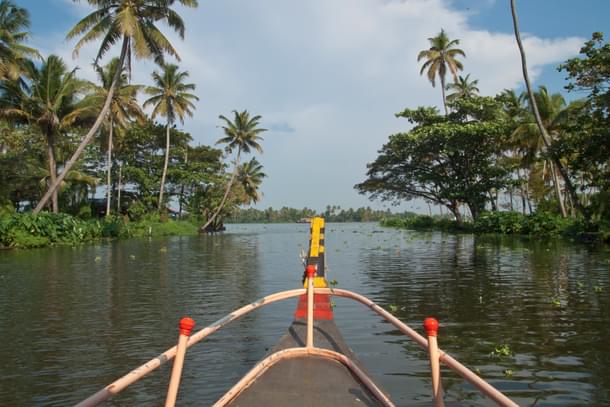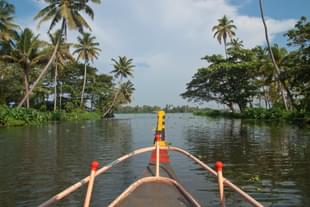Kerala
Beyond The Backwaters: How Kerala Can Emerge As A Global Tourism Powerhouse
Ravishankar
Dec 08, 2024, 03:08 PM | Updated 03:07 PM IST
Save & read from anywhere!
Bookmark stories for easy access on any device or the Swarajya app.


Kerala, renowned for its cultural richness and natural splendour, is grappling with severe financial constraints.
The inability to sustain social welfare programs, delays in disbursing pensions, and even setbacks in paying government employees' salaries have underscored the urgency for economic revitalisation.
Despite being home to one of India’s largest pools of highly skilled professionals, the absence of robust industrial growth has stalled Kerala’s economic potential, which is in turn impacting the broader national economy. This paradox of immense talent juxtaposed with limited opportunities demands immediate intervention.
Tourism, with its proven potential for rapid economic recovery, presents an ideal solution. If Saudi Arabia, a Middle Eastern nation starting from scratch to develop tourism infrastructure, can centre its economic future on tourism, then Kerala—a culturally and naturally blessed state—can undoubtedly leverage its inherent advantages in tourism to drive economic revival.
By harnessing its exceptional heritage and natural wealth, Kerala can aspire to establish a strong tourism economy, transforming its current challenges into a platform for sustainable growth and prosperity. The state must take a multi-pronged approach that focuses on strengthening infrastructure, diversifying tourism offerings, and targeting high-value markets.
For instance, the transformation of Singapore’s Changi Airport into a global tourism hub is a lesson in vision and execution. Handling millions of passengers annually, Changi is much more than an airport; it is a destination that integrates world-class shopping, entertainment, and cultural experiences. The Jewel Changi complex, with its iconic indoor waterfall and lush gardens, exemplifies how infrastructure can serve as both a transit point and an attraction.
Kerala, with its strategic position between Southeast Asia and the Middle East, can emulate this success by modernising its airports in Kochi and Thiruvananthapuram to not only handle increased passenger traffic but also to showcase the state’s unique culture and heritage through art installations, culinary offerings, and immersive experiences. Such upgrades would position Kerala as a key stopover destination, much like Singapore.
Connectivity within the state also needs significant improvement. Malaysia’s North-South Expressway, a model of efficient infrastructure, links urban centres with rural and tourist destinations, facilitating balanced economic development. Similarly, Kerala must invest in highways and rail networks that seamlessly connect its cities with lesser-known destinations like Vagamon and Wayanad.
An integrated transport system that mirrors Switzerland’s Swiss Travel System—where trains, buses, and ferries operate on a single, tourist-friendly pass—can ensure easy access to the state’s diverse attractions, from the hill stations to the backwaters. Such connectivity would significantly enhance the overall tourist experience while ensuring equitable development across Kerala.
Another cornerstone of this strategy is creating all-inclusive tourism hubs, inspired by Dubai’s Downtown district, which combines luxury accommodations, shopping malls, dining, and iconic landmarks like the Burj Khalifa. Kerala can replicate this by developing premium backwater resorts that integrate Kathakali performances, Ayurvedic spa treatments, and curated culinary tours. These hubs can cater to high-spending tourists seeking holistic and immersive experiences, elevating Kerala’s status as a global destination.
Diversifying tourism offerings is equally crucial. Bali’s wellness tourism, which seamlessly blends luxury with traditional healing practices, attracts millions of visitors annually. Kerala’s Ayurveda, with its centuries-old legacy, offers an unparalleled opportunity to build a global brand in wellness tourism.
The town of Kottakkal, home to the renowned Arya Vaidya Sala, already enjoys global recognition as a centre of Ayurvedic excellence. Kerala can further solidify its position in the wellness tourism sector by expanding wellness hubs around Kottakkal, developing Ayurvedic centres of excellence, and integrating them with luxury accommodations and curated wellness packages. Dedicated wellness hubs that combine modern comforts with authentic Ayurvedic treatments can position Kerala as a leader in this lucrative sector.
Japan’s success in cultural tourism demonstrates the potential of interactive and participatory experiences. Activities such as tea ceremonies and samurai workshops have captivated international tourists. Kerala can adopt a similar approach by offering visitors opportunities to learn Kalari Payattu, partake in temple festivals, or cook traditional Kerala dishes. Such immersive experiences not only enhance tourist engagement but also create lasting impressions that differentiate Kerala from other destinations.
Elevating Kerala’s backwaters to a global standard requires looking at Vietnam’s Halong Bay, where luxury cruises offer curated experiences combining sightseeing with gourmet dining and entertainment. Kerala can introduce high-end houseboats equipped with modern amenities, offering exclusive itineraries through its iconic backwaters.
Similarly, Costa Rica’s eco-tourism model underscores the importance of sustainability. By integrating conservation efforts with eco-lodges and guided wildlife tours, Costa Rica has tapped into the growing demand for sustainable travel. Kerala is uniquely positioned to adopt similar eco-tourism practices with its rich biodiversity and protected areas. The Western Ghats, designated as one of the 15 biodiversity hotspots in the world, is home to an extraordinary array of flora and fauna.
National parks like the Silent Valley and the Periyar Tiger Reserve offer unparalleled opportunities for eco-tourism. Silent Valley, for instance, is renowned not only for its pristine rainforests but also for the absence of cicadas—a unique ecological feature that offers visitors an exceptionally tranquil experience unlike any other forest in the world. The Periyar Tiger Reserve, on the other hand, combines breathtaking landscapes with the thrill of spotting wildlife, including the majestic Bengal tiger. These parks, with their exceptional biodiversity, can serve as cornerstones for Kerala’s eco-tourism initiatives.
Targeting high-value markets is the final piece of the puzzle. The Maldives has demonstrated how exclusivity and premium pricing can generate significant revenue through luxury resorts. Kerala’s tranquil backwaters and serene hill stations are equally suited for boutique resorts offering tailored experiences.
Tuscany’s success as a wedding destination offers another avenue for Kerala. The state can attract international weddings by promoting its scenic locations and cultural richness, supported by professional event planners and world-class venues.
Additionally, Kerala’s potential as a hub for Meetings, Incentives, Conferences, and Exhibitions (MICE) tourism can be unlocked by establishing state-of-the-art convention centres in cities like Kochi and Thiruvananthapuram. Singapore’s dominance in this segment highlights how infrastructure and efficient organisation can attract high-spending business travellers.
The above examples from around the globe were specifically brought in to showcase that most of the tourist attractions hosted by the world already exist in Kerala. This fact provides the greatest confidence in pushing forward the idea of a strong tourism economy for the state.
Kerala can transform its tourism landscape by investing in world-class infrastructure, diversifying offerings to cater to varied interests, and targeting high-value markets. Each example—from Singapore’s airport hubs to Costa Rica’s eco-tourism—provides actionable insights that Kerala can adapt and scale.
By embracing innovation, sustainability, and inclusivity, Kerala can address its economic challenges while positioning itself as a global tourism leader, setting a benchmark for others to emulate.
Ravishankar is a political analyst and commentator. He tweets at oru_pavam_nair.




